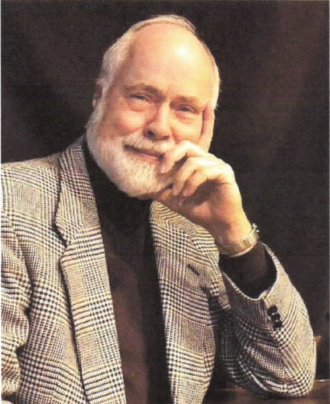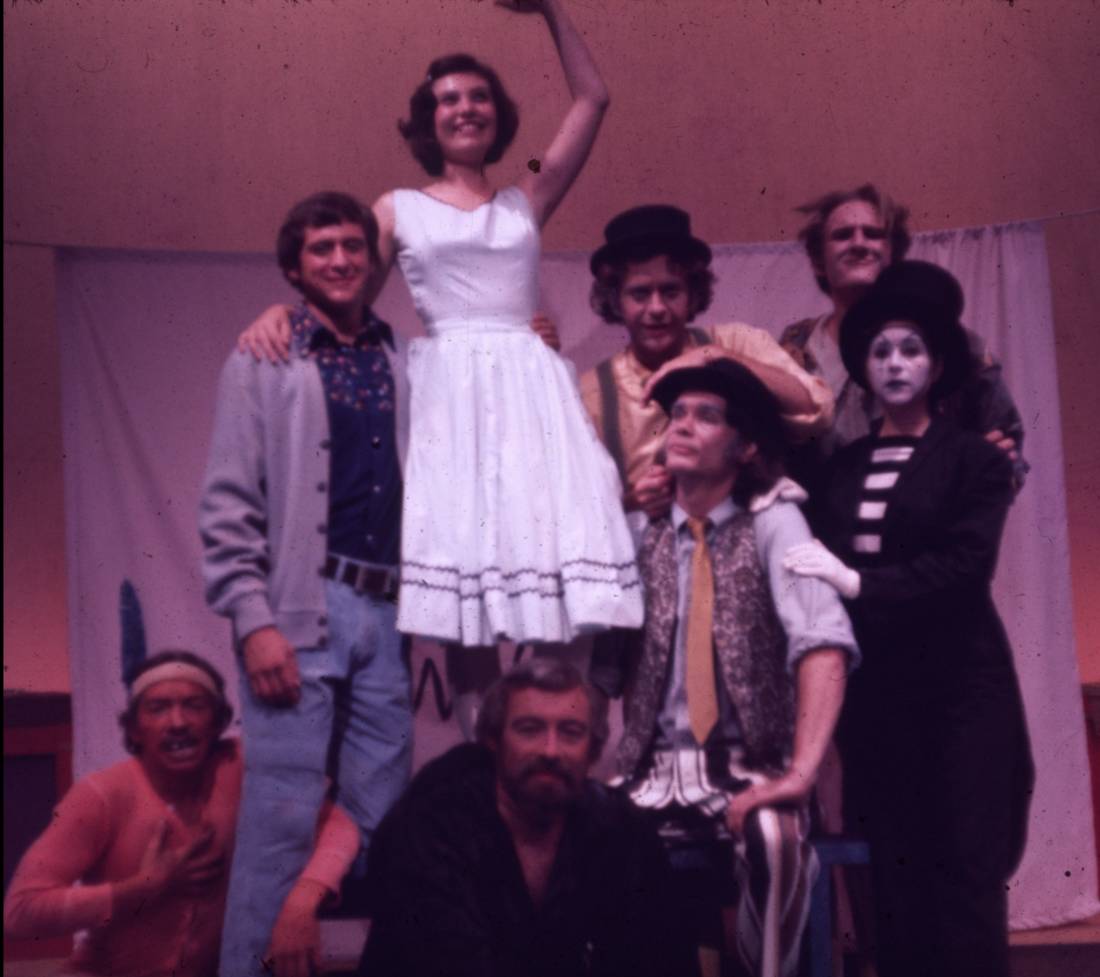Every once in a while, something productive and constructive arises from locker room talk.
Take, for instance, one such conversation in 1974 that occurred in the men’s locker room at the gym of Mars Hill College (now Mars Hill University). Jim Thomas of the theater arts department and Don Anderson of the social and behavioral sciences department were chatting about ways for Madison County to celebrate the U.S. bicentennial in 1976. And the seeds for what became Southern Appalachian Repertory Theatre (SART) were planted.
“[People] tell that story all the time, and I believe it because that’s the way wild things happen,” says playwright C. Robert Jones, who eventually succeeded Thomas as department chair.
Nearing the end of its 50th season, SART wraps things up Thursday, July 18-Sunday, July 28, with alternating shows of Jones’ play Taking a Chance on Love, and a stage adaptation of Wilma Dykeman’s novel The Tall Woman. In the midst of the company’s rehearsals and preparations for celebrating the milestone season, Xpress checked in with Jones and a few other integral players to reflect on SART’s history and what they hope lies ahead.
Early days
In 1967, Thomas started a summer theater workshop, primarily designed for Mars Hill students seeking college credit. The following year, he invited Jones — then the chair of the theater department at Gardner-Webb University in Boiling Springs — to direct a show.
“I did and fell in love with this place,” Jones says. “They offered me a job, and I was already busy working at Gardner-Webb at that time. But I did come here in ’71.”
After Thomas’ fateful locker room discussion, he, Jones and their colleague Virgil Gray decided to reshape the summer theater workshop into a professional company. For SART’s inaugural season in 1975, they produced The Fantasticks, Black Comedy and the company’s first original show, Ark of Safety, all in the campus’s Owen Theater.
“It was much easier than it might have been for any other situation because we had the theater, we had the department, we had the program — everybody in place,” Jones recalls. “And that’s how it started.”
The three men initially used the repertory system in which a company of actors simultaneously does two or three rotating productions. But Jones notes that Owen Theater, formerly a church, lacked the necessary space for multiple stages and storage.
“So, it became logical for us to do a show, close it, do another show, close it,” he says.

In recent years, the theater has been renovated to accommodate more ambitious productions, and in 2017, the university added a black box theater in adjoining Day Hall, where smaller shows are performed.
The black box space is named in honor of Thomas, who served as artistic director until his 2000 retirement. Jones credits much of SART’s success to his colleague’s commitment to staging an original play every year, which quickly proved more popular than more famous, existing works. Thomas also prioritized scripts that reflect positively on Appalachia rather than reinforce negative stereotypes.
“It was a venture and an adventure,” Jones says. “I remember the first season, we seriously didn’t know anybody would come. But people came from everywhere, and Madison County as a whole really loved this idea because it gave a lot of people a chance to come see theater.”
SART’s 50th season honored its roots with a staged reading/concert event of The Fantasticks, featuring notable performers from the company’s history. Audience favorite Fiddler on the Roof was also staged, and now it’s Jones’ turn in the spotlight.
The playwright says he received requests for a revival of his antebellum musical Mandy Lou, but notes that some of the show’s politically incorrect details make it a difficult one to stage. Instead, he chose the romantic comedy Taking a Chance on Love to close out the drama-heavy season on a lighter note.
Bringing the play to Owen Theatre, where it debuted in 2006, are a few key figures who were involved in that original production. Bill Gregg returns as director, Richard Seagle is again designing the set, and Alyssa Kennedy is playing the same part she inhabited nearly 20 years ago, which Jones describes as “an Alexis Carrington kind of woman,” referring to the character from TV’s “Dynasty.”
“I can’t tell you how delighted I am,” Jones says of the minireunion. “It’s nice to revisit.”
SART Trek: The Next Generation
Jones’, Thomas’ and others’ dedication to SART helped keep the company active and has attracted a new batch of similarly minded professionals.
Among them is Asheville native Chelsey Lee Gaddy, who attended Mars Hill for its theater arts program. When she learned about the campus’s summer theater program, she immediately wanted to partake. Since 2003, she’s worked on and off at SART, including several years as senior artistic director.
“It was the stepping stone for all the other things that I was able to do later,” Gaddy says. “Even my internship that I got after graduate school was because of somebody I had met at SART..”
She adds that SART provided a safe place to make what she calls “good mistakes,” such as forgetting lines or oversleeping and missing rehearsal. And as her career developed, she kept getting pulled back to where it all began.
“I would go work somewhere else for a few years and then end up doing a show again,” Gaddy says. “This is my 14th, maybe 15th season that I’ve done at SART. It’s been a part of my life since I was a young’n, and I’m about to be 40.”
Mentorships have also proved key to Gaddy’s sustained bonds with SART. She’s found that experienced theater professionals with long-standing ties to the company have been happy to share advice when asked, and now she finds herself in that position.
Gaddy met Will Ezzell in 2018 while both actors were working on Asheville Community Theatre’s production of Avenue Q. Through the collaboration, she sensed that Ezzell and several other castmates could be great fits for the SART family and recruited them.
“Miracle in Bedford Falls [in 2019] was my first show there,” Ezzell says. “Then while we were doing Miracle, Chelsey was asking me who would be good for a pastor in Church Basement Ladies. And I was like, ‘Well, I would.’”
In addition to the company’s tightknit family feel, Ezzell says SART has allowed him to use his theater skills outside of acting. And in his current role as managing artistic director, he’s prioritized giving fellow multifaceted cast and crew members similar chances — sometimes out of necessity.
“In Fiddler, our stage manager also was an ensemble member, and our lighting designer was the innkeeper,” he says. “I don’t think a lot of theaters give you the opportunity to do that.”
Ezzell and Gaddy also point to SART’s history of producing original plays — which they note often requires some workshopping before they hit the stage — as central to its distinct ways. And the steady incorporation of community members as cast, crew and volunteers further strengthens the company’s connection to Mars Hill and Madison County.
“It’s pretty special that we are in such a small town that still values its theater and the arts so much,” Ezzell says. “Having everybody come to know the theater as an asset to the community and to see people’s excitement and enjoyment when they do come to a show is really meaningful to me.”
In the year 2074 …
Looking ahead, Gaddy is confident in SART’s ability to “pivot and bring people what they need to see, depending on the temperature of the world surrounding us.” And Season 50’s slate is a big reason why she’s optimistic.
She feels that it was important to produce Fiddler on the Roof at a time when antisemitism is again on the rise. But likewise, it’s paramount to “do something that makes people feel good,” like the Woody Guthrie show Hard Travelin’ with Woody, plus End of the Rainbow, which starred Gaddy as Judy Garland, spotlighting addiction, toxicity and show business’s darker side.
“So, whatever it means for us to get to be storytellers and make people out there in our community keep using their brains,” she says. “I love that about SART — we actually bring it to you and make you think, even if it’s just ‘this land is your land.’”

She and Ezzell hope that the consideration put forth in programming Season 50 shows that SART is committed to producing quality work, to the extent that the community will continue to support the company as operating costs become increasingly expensive. To those ends, SART’s director of development, Leif Brodersen, launched the SART Endowment with an initial goal of sustainably funding one musical each year.
“The goal with this season isn’t to fill the endowment immediately,” Ezzell says. “It’s to produce work that makes people feel confident and trust us enough to fund that endowment so that we can exist for another 50 seasons and more.”
Jones also has a sunny outlook regarding SART’s future, largely because the company has carried on Thomas’ commitment to creating a welcoming environment that “feels like you’re coming home to something.”
“People became very possessive about this place. They wanted it to succeed and they wanted it to work in this unlikely place: a Baptist college campus in the mountains — how likely is that to have a professional theater company?” he asks.
“I’d like to think that the legacy was that we gave quality theater, professionally done, with great love and affection. And I felt those things, and I still think that it was a magical thing that we were just lucky that we fell into.”
To learn more, visit avl.mx/drj.




Before you comment
The comments section is here to provide a platform for civil dialogue on the issues we face together as a local community. Xpress is committed to offering this platform for all voices, but when the tone of the discussion gets nasty or strays off topic, we believe many people choose not to participate. Xpress editors are determined to moderate comments to ensure a constructive interchange is maintained. All comments judged not to be in keeping with the spirit of civil discourse will be removed and repeat violators will be banned. See here for our terms of service. Thank you for being part of this effort to promote respectful discussion.